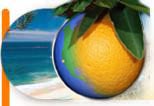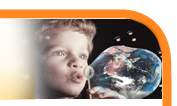|
Featured
Article
What
is Earth Day and How Can We Help?
by Julie M. Armenta, M.A.
Education & Family Specialist
Armenta
Learning Academy
On
April 22, 1970, 20 million Americans took to
the streets and parks and auditoriums to demonstrate
on behalf of a healthy, sustainable environment.
Having a rare political alignment, Earth Day
achieved support from Liberals, Democrats, Republicans,
and Independents. Earth Day also earned support
from different social classes rich, poor, urban
dwellers, farmers, businesses, and labor leaders.
The first Earth Day lead to the creation of
the U.S. Environmental Protection Agency, and
to the passage of the Clean Air Act, the Clean
Water Act, and the Endangered Species Act. Earth
Day is now globally celebrated around the world.
Earth
Day is not just one day out of the year. We
need to stop and appreciate the Earth through
lifestyle changes and daily effort. Help us
to save our Earth. Take a minute and make a
difference in the future of our world.
This
is how we can make a difference:
I. Consume less energy.
You may already have seen on TV that California's
government encourages everyone to save energy.
By saving energy, you will not only benefit
the environment but also reduce your monthly
bills. A general rule is to turn off lights
in unoccupied areas and use shades and blinds
on a warm summer day instead of the air conditioner.
If you own florescent lights, keep them on all
day instead of turning them on and off - it
takes more energy to turn them on several times,
then to keep them running all day. There are
some environmentally friendly ways of achieving
energy such as biomass, fuel cells, geothermal,
hydroelectric, solar cells, wind etc. We hope
to be able to achieve all our energy from these
sources in the future.
II. Recycle.
Find the nearest recycling center and distinguish
between different types of garbage. There is
a huge difference between the gases that are
formed when waste such as food waste, plastic,
packaging, tires, electronic products, batteries,
etc are burned. If we separate them, then we
will reduce our own expenses again. You may
ask, how is recycling going to save us money?
If we recycle our waste, we don't have to pay
indirectly through taxes for someone else to
recycle afterwards.
III.
Drive less.
This seems to be a hard thing to do in California,
but exploring adventures in our own neighborhood
by biking, visiting our local beach, going to
a new café, participating in different physical
activities, instead of spending our weekend
in a traffic jam would be an easy choice. For
people who commute, find a partner you may share
rides with. When we drive, carbon dioxide, a
chemical, is released to the air. Too much of
it will lead to disastrous effects. California
is known for its smog build up resulting in
serious health effects. By polluting the air,
we are polluting our water simultaneously by
acidic rain.
IV.
Save water.
Take showers instead of baths, or not as often.
Any left over water can be used to water plants
instead of the sink. Turn off your sprinklers
during the rainy season. Overall, try to use
as little water as possible, and save as much
as you can every day. The smallest drop could
make the biggest difference in the long run.
V.
Protect your ground.
Don't throw any waste products on the streets
or in the ocean. Volunteer to clean up instead!
Be a good role model for other people by protecting
your environment and preventing future health
hazards.
VI.
Educate yourself and others.
Learn more about the alternative fuels and teach
others. What better way is there to convince
people, than by sharing your own experiences.
And last but not least, enjoy taking part in
your community. Remember that we are here to
make a change, prevent disasters, and make the
world a better place. We are here to determine
our future...not follow it.
Here
are some more ways to celebrate and protect
the Earth with your children:
Put on an environmental awareness fair.
Feature "hot" environmental concerns such as
Wildlife Issues, Global Warming and Energy Use
Forest Conservation, Air and Water Pollution,
Biodiversity, or Sustainability.
Address
a local or global environmental problem at home.
With family, have each person brainstorm to
decide on an environmental issue to investigate.
Then instruct them to conduct research on the
problem. Have each individual report their findings
to the family, including any possible solutions
identified.
Do
an environmental survey.
How much and what kind of energy, paper, and
cleaning supplies are used monthly at your home?
How much water is consumed? How much waste,
and what type of waste is generated? Identify
ways your home can reduce its use of energy
and other resources. Report your findings to
the family.
Get
creative!
Have your children write poetry, create art,
or develop dramatic presentations on environmental
themes.
Expose
your students to environmental issues.
Visit or contact an expert and have your child
interview them about environmental issues. Assign
your projects ahead of time that relate to the
subject of the presentation.
Adopt
a local park, stream, or beach and clean it
up.
Organize a clean-up day near your home.
Set
up an organic garden.
Make sure to incorporate a compost pile for
biodegradable garbage (no meat!). When it turns
to compost, use it in the garden.
Develop
an environmental policy for your home.
This is best as a collaborative effort among
the family and neighborhood. Have the neighbor
or community leader officially launch the policy
on Earth Day.
Create
a community green map.
Your map should highlight all of the environmental
assets in your community (such as parks, recycling
centers, farmers' markets, public transit stations,
etc.)
Imagine
the future.
Have your family write an essay or have a discussion
answering the question: "What might the environment
be like on Earth Day 2025?"
Peace
and care of the Earth begins in the mind. On
Earth Day we can think, pray and plan what we
will do to restore and renew the wonder of life
on our planet. A "New Day" when differences
are forgotten as we share the wonder of nature's
new life and new beginning.
Article
supplie by
Julie M. Armenta, MA Founder & Education & Family
Specialist
Armenta
Learning Academy
26041
Cape Dr., #270
Laguna Niguel, CA 92677
949-367-WISE(9473)
academicsuccessnow@yahoo.com
|



![]()
